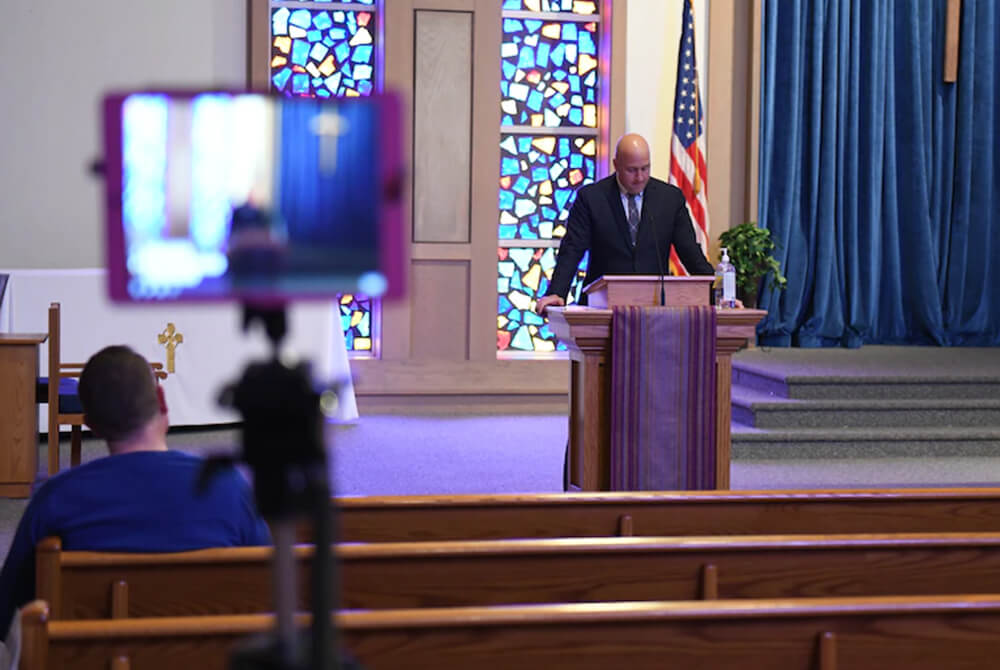Best Web Hosting for Church Websites
Every church should have its own website, but you’ll first need hosting services prior to taking your domain live. There are countless options out there, so it can be difficult judging who offers the best web hosting for church websites. At the end of the day, however, it all comes down to your ministry’s specific needs.
Church Web Hosting Options
There are several types of web hosting services available, but most of them will fall into just a few groups. All these options have their own pros and cons, so it’s important to fully understand each of them before making a commitment. The following information will give you a general idea of what to expect from each type:
- Shared: Popular among first-time websites, but all resources must be shared with other domain owners.
- Virtual Private Server (VPS): Similar to shared hosting, but fewer sites take away from your resources.
- Dedicated server: Your website is hosted on a server that’s reserved only for your use.
- Cloud hosting: Website is hosted on a virtual network containing many different servers.
Dedicated options are the quickest growing form of web hosting available, and while they cost more, the performance is much better. Entry-level options (e.g. shared and VPS), however, are more affordable. Cloud servers are also beneficial due to the availability of various resources.
Since this decision should be based on what your church needs, though, how do you figure out exactly what to look for?
Church Web Hosting – What Should You Require?

Exactly what would the best web hosting for a church website offer? The promise of unlimited data transfer and bandwidth may stand out – especially if you plan on maintaining an informative and up-to-date church blog – but the truth is that these features are simply marketing buzzwords.
Every web hosting company will eventually throttle your bandwidth or cancel your service if you exceed a certain limit. This means you shouldn’t disqualify a certain provider simply because it doesn’t offer “unlimited” features. A church’s bandwidth needs aren’t typically extensive, so caps on storage, data transfer and bandwidth are sometimes okay.
When looking for the best web hosting for church websites, though, there are particular features you shouldn’t go without. Your eventual choice should include at least the following specs:
- Database
- Email accounts
- FTP access
- PHP
- SSH access
- Upgradeable disk space
If these features sound like gibberish, you may be better off selecting a hosting service that includes a website builder. This is ideal if you’re just starting out, and it will make most of the requirements mentioned above unnecessary. If you plan on using a WordPress theme or managing your own design, however, those features should be mandatory.
Why Use a Website Builder?
When you select a web hosting service that has its own website builder, you’ll be given a variety of easy-to-use tools for creating your site. Premade templates make it easy to achieve a professional look, and most offerings have themes that are geared towards nonprofits and Houses of Worship.
Among the choices of best web hosting for church websites, those that offer do-it-yourself building tools simplify the entire process. Their entire interface is built around the idea that their clients have no clue how to deal with coding or digital design. Website builders make it easy to bring your vision to life.
The other great feature of website builders is that most of these services also provide web hosting. This means there’s no need to do the research on how to direct your domain to your host. Everything is handled for you, and really, what could be better when choosing a church web hosting service?
Best Web Hosting for Church Website Combos

If you’re one of the many ministry leaders who believe that the best web hosting for church website providers will also offer site builders, you have plenty of great options to choose from. Each of the following choices seamlessly take you through the process of setting up your website quickly and easily.
These tools will also walk you through setting up your website name, so there’s no need to deal with the scary technical aspects that have long kept you from claiming your own corner of the internet. Remember that there are many builder and hosting combos out there, but you should stick with well-known and reputable firms.
The most recommended services in the area are Squarespace, Wix and Weebly. Here are just a few of the reasons why:
1. Wix
With hundreds of premade website designs and a simple drag-and-drop user interface, it’s easy to understand why so many believe that Wix provides the best web hosting for church websites. They have an entire template section dedicated to religious and non-profit sectors. Their plans start right around $10/month, but you can get the VIP features for $39/month.
Pros
- Availability of apps (free and paid) to enhance design and functionality.
- Templates are optimized to offer faster load times.
- Free SSL security certificate included in every plan.
- Option to have free professional logo created.
- Free domain introductory offers.
- Hundreds in ad vouchers offered on certain plans.
Cons
- Beginners may be overwhelmed by how many options are offered.
- Lower-cost plans feature ads and don’t offer a free domain.
- You’re not allowed to redesign your website or change templates.
- Free domains are only offered to yearly plan customers.
Even with these few disadvantages, Wix is easily one of the best web hosting for church website services. You won’t typically encounter performance issues, and setting up a site is made easy even for the most inexperienced users.
2. Squarespace
Comparing Squarespace to Wix is a difficult task. Their offerings are each vast, so it all comes down to your specific needs. While Squarespace generally has nicer premade templates, for instance, you don’t have the drag-and-drop editor that’s so popular on Wix. You will still find an entire template section devoted to churches and nonprofits, though, and their plans range from $12 to $40 a month.
Pros
- More than 100 quality website themes.
- Themes offer tablet and mobile optimization.
- Great customer support and quick help via live chat.
- Quality podcast and blogging features.
- Certain plans come with an AdWords voucher for $100.
- All plans feature a free SSL security certificate.
Cons
- Only yearly and bi-yearly plans get a free domain.
- Design editor isn’t as simple to use as Wix.
- No backup feature offered (Wix and Weebly both have this).
- Page loading takes longer than on Weebly or Wix.
If your idea of the best web hosting for church websites includes a heavy focus on design quality, Squarespace is likely your best bet. Ministries who are considering podcasts or trying to figure out ideas for virtual services will also benefit. While the design editor isn’t as easy to understand as Wix’s offering, it’s still very beginner-friendly.
3. Weebly
Although it’s not as intuitive as Wix and Squarespace, Weebly is still one of the best options when it comes to web hosting and website builder combos. There’s a limited drag-and-drop design editor, and the templates are customizable and mobile-responsive.
They also have a well-rounded offering that will work well for many ministries. The costs of their various plans are right in line with their two main competitors and include unlimited bandwidth. Check out their various website templates here to get an idea of what your site could look like.
Pros
- Has the simplest onboarding for new users.
- Faster page loading speeds than Wix or Squarespace.
- Retargeting, opt-in tools and more available via JavaScript.
- Better search engine optimization than Wix.
- All plans feature free SSL security certificate.
- Pro and Business plans include unlimited storage.
- Pro and Business plans get $100 AdWords credit and free domain.
Cons
- Lack of ADI feature makes manual creation necessary.
- Minimum versatility in drag-and-drop editor if you don’t have coding knowledge.
- Only yearly and bi-yearly plans have free domains.
- Blogging features don’t live up to Squarespace offerings.
- Wix offers better backup functionality.
- Page, image management and navigation tools are lacking.
Even though Weebly may fall short in some areas, its search engine optimization and marketing features make it an obvious contender in the arena of best web hosting for church websites. The loading times, quality templates and competitive pricing are also huge benefits, but make sure you consider the disadvantages before choosing this tool for your ministry website.
Best Standard Web Hosting Services

There are many benefits to choosing a hosting service that includes a website builder, but there are also some drawbacks. The most obvious issue is that you’re paying for an additional service – which often comes at a premium – even though web hosting is often the only thing you need after initial setup. Additionally, you typically can’t take your design elsewhere if you change providers.
If you only need the best web hosting for church websites – foregoing site builders altogether – you can download free and paid WordPress church templates. Once this is done, the following platforms are often your best option:
1. Namecheap
When choosing a standalone hosting service, Namecheap very often provides the most bang for your buck. Hosting options include managed WordPress, VPS, dedicated and shared servers. You can also snag a low-cost plan for just a few dollars monthly, and if you pay for a year upfront, the price typically drops by half.
Pros
- A variety of options with affordable pricing.
- Fully scalable thanks to easily upgradable plans.
- Multiple websites can be hosted on the same plan.
Cons
- Customer service could use some work.
- Plan limitations could cause issues if high-traffic days occur.
- Uptime isn’t 100%, so users may be unable to reach your site.
Due to their variety of pricing plans and performance that’s sufficient for most ministries, Namecheap is an obvious standout in the realm of best web hosting for church websites.
2. SiteGround
Church leaders seeking low cost options could pay as little as $5 a month at SiteGround. The pricing can climb significantly for certain plans, but you have a wide range of hosting products to pick from. You can also choose between dedicated, managed WordPress, cloud and shared servers.
Pros
- Speed performance is among best in industry.
- Customer service can be reached by chat, phone or ticket.
- Even cheap plans can handle 10,000-100,000 monthly visitors.
Cons
- Monthly fees greatly exceed those at Namecheap.
- Lowest-cost plan only features hosting for one domain.
- Shared hosting plans have limited disk space.
Even with these disadvantages, SiteGround is just as flexible as Namecheap. The real benefit of the former is their superior customer service. Their impressive offerings make the higher price justifiable when seeking the best web hosting for your church website.
This is also a solid choice if you’re utilizing the DonorWerx Strategic Development Process. Even the cheaper plans will be able to handle the increase in web traffic following implementation of our church leader coaching framework.
3. Hostinger
Offering both affordable plans and multidimensional web hosting services, Hostinger is another great option for your ministry website. Managed WordPress, VPS, cloud and shared servers can all be used. If you opt for a shared hosting plan, you’ll spend less than $5 per month. This is even more affordable than Namecheap plans.
Pros
- Entry-level hosting plans are among the most affordable on the market.
- The onboarding process is extremely beginner friendly.
- Live chat is available any time, day or night.
Cons
- Inconsistent performance could affect load times.
- Hosting only available on one domain for cheapest plans.
- All shared hosting plans have limited disk space.
If your top priority is affordability, Hostinger is the way to go. Unfortunately, this will typically result in a lack of premium performance. The service is very similar to Namecheap’s entry-level plans, but you’ll save money with Hostinger. If you expect high traffic, though, SiteGround is the way to go.
Does your idea of the best web hosting for church websites include a service that’s specific to ministries? In that case, Christian Web Host might be the way to go.
Christian Web Host

Since they have over 20 years of experience, you can trust that Christian Web Host has the experience to provide the services you need. Plans range from $10 to $20 a month, and although their shared hosting plans are basic, you can count on dependability from the company.
You’ll find that their specs are more than enough for beginner sites, but a VPS plan upgrade will provide better performance at just $30 to $50 a month. While these hosting services aren’t necessarily superior to any of the other firms mentioned, the company understands all the intricacies and nuances of running a church website.
Work Hard to Find the Best Church Web Hosting Service
The best website in the world couldn’t do much without a reliable web hosting platform behind it. Fortunately, there are numerous options to choose from. It all comes down to your ministry’s specific needs, but always consider scalability in your final decision. After all, every House of God should leave space to grow!
Do not be concerned that some of the platforms offering the best web hosting for church websites don’t have payment-related features. While tools like WooCommerce can be super effective, try out digital church donation software instead. These resources are geared towards the need of ministries, so you can expect better performance.



